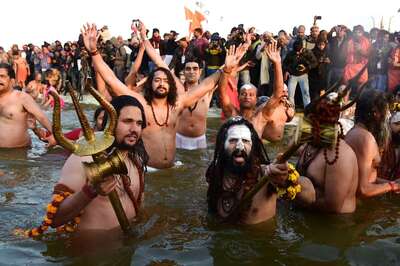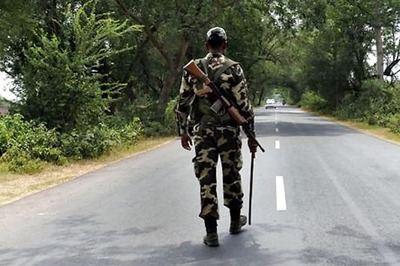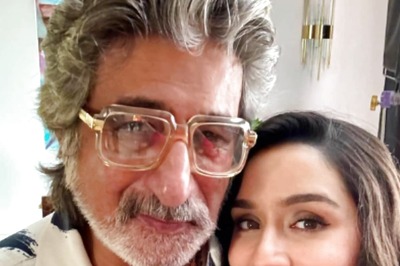
views
New Delhi: In an unprecedented admission a retired ISI chief has told News18 that Pakistan is actively involved in the current unrest in Kashmir.
Lieutenant-General (retd) Mohammad Asad Durrani, who served as ISI’s chief from August 1990 to March 1992, when asked about Pakistan’s involvement in the current turmoil in Kashmir, said, “One indeed could not be “playing fiddle” while Kashmir burns and bleeds.”
Durrani assumed the office of ISI’s directorate at a very interesting time for Pakistan. The Soviets were withdrawing from Afghanistan and simultaneously, not coincidentally, foreign militants had begun infiltrating and training local Kashmiris to fight India.
Incidentally, on this side of the border, during the same period - 1990, leading the intelligence operations as the joint director, Intelligence Bureau, in Kashmir, was AS Dulat, with whom Durrani has now co-authored a book - ‘Spy Chronicles, RAW ISI and The Illusion of Peace’. Dulat would later go on to head India’s external spy agency - the Research and Analysis Wing (R&AW) and become Prime Minister Vajpayee’s advisor on Kashmir.
In an interview with News18, Durrani, whom Dulat often refers to as ‘General Saheb’, spoke about many of the subjects that he and Dulat have discussed in the book. Here are the edited excerpts from the interview:
Q: In your discussion with AS Dulat in the chapter on Kulbhushan Jadhav in your book, you say "I agree with my friend (AS Dulat) that Jadhav would eventually be back, despite the poor handling of the case by us. A better way would have been to send a message to the RAW that we had him, extract all the overt and covert benefits, and at some stage return him at the right price." Do you still think it is possible for Pakistan to return Jadhav to India at some price?
Durrani: I am counting on the two sides - both sensible and professional - to follow the universally accepted, even though informally, sound practices. Price in such cases is always an “exchange”. For someone like Jadhav, India might have to return (many) more than one.
Q: In another section of the book, while discussing Kashmir, you say “the formation of the Hurriyat to provide a political direction to the resistance was a good idea,” but, “giving up handle on the movement – letting the factions do what they bloody well wanted to.” Pakistan has for the longest time maintained that Hurriyat and Kashmiri separatism was an indigenous movement. Do you disagree with this view and admit that Pakistan had a role to play in creating and facilitating the Hurriyat, as well as armed separatism through outfits like JKLF, Hizbul Mujahideen, Lashkar-e-Toiba?
Durrani: I am not aware of the others, (except for JKLF that has been there for a long time—and was not Pakistan sponsored), but yes the Hurriyat was formed because all such movements ultimately need a political umbrella. I’m not sure if Pakistan ever denied the credit to give the resistance a political direction.
Q: Dulat has claimed, many a times, that Hurriyat is the Pakistani team and that Pakistanis are getting a free ride in Kashmir right now. Do you agree, and if yes, then what is the extent of Pakistan’s involvement in Kashmir right now?
Durrani: I am not aware of the clout of Hurryiat or Pakistan’s influence and involvement, but yes, some in Pakistan may have reasons to watch India lose its grip over the Kashmiris with expectancy. One indeed could not be “playing fiddle” while Kashmir burns and bleeds.
Q: How do you see the situation in Kashmir playing out a year or five years from now. To a hypothetical question on, for instance, Omar Abdullah, you say “Twenty years from now, Omar Abdullah is, let’s say, a member of the Kashmir Muslim Conference.” Could you please expand on this?
Durrani: That’s when we were “flying kites”, it is not to be taken seriously. The crux was that we could not predict how a fluid situation like that might evolve, and so everything was “possible”.
Q: One of the biggest fears among citizens in both countries is the possibility of a nuclear strike. Both the countries, which share seven decades of mutual hostility, are nuclear armed. Often very irresponsible statements on using these weapons are exchanged. Did India or Pakistan ever come close to pressing the N-button?
Durrani: No, we never came close to or even thought about using nukes. It is the last decision anyone in the two countries would take. Everything possible would be done not only not to use them, but also minimising the chances of their use.
Q: India has just announced a ceasefire in Kashmir and an Indian delegation is on its way to Islamabad to participate in the anti-terrorism conference. Do you consider the two events related? Are we looking at the beginning of a thaw in the relationship between the two countries?
Durrani: I am not aware of any serious efforts or change of hearts. Conferences in any case have never impressed me, nor the gimmicks like “Ramadan Ceasefires”. They may lead to something better or at best they could allow for some breathing space. It is possible that the ceasefire was announced because the situation was becoming untenable, but another episode bringing us back to square one is more likely.
Q: The political cost of handing over Hafiz Saeed is too great, you say in a section of the book. But do you think, as a token of trust between the two countries, we could one day see someone like a Syed Salahuddin or a Masood Azhar or Dawood Ibrahim being handed over to India? Would you consider such a move to be a huge morale booster for the cooperation between the two countries?
Durrani: Neither trust nor confidence is built on such petty matters. More likely, these acts would be seen as “appeasement” in India and “surrender” in Pakistan: nowhere near building “trust”, which in any case is a rare commodity in international relations and improves only when we find “common interests”.
Q: A lot of people have been claiming a ‘hidden hand’ in the legal cases that Nawaz Sharif is facing. Do you consider in near future coup a possibility?
Durrani: In principle, I never comment on political matters: internal or external. In this case, I neither know about the “hidden hand”, nor likely to speculate about a (military) coup.
Q: As has been suggested by Dulat, do you think an invitation from India to Nasir Janjua or Gen Bajwa, or from Pakistan to Ajit Doval or Gen Bipin Rawat, a possibility?
Durrani: Possibilities, they certainly are though not very likely.
Q: Does the ongoing conversation between the two Koreas inspire you to believe that such a dialogue and mutual trust could be developed between Pakistan and India, leading them to hold highest level talks anytime soon? A related question – who in your opinion scuttled the Agra talks?
Durrani: The two Koreas are no role models for us. We have done better than them in the past. When it came to Agra, I deferred to Mr. Dulat, who indeed had better inkling.
Q: Could Afghanistan ever become a common ground for cooperation between India and Pakistan?
Durrani: At one stage I considered Afghanistan to be the most likely area in which we might cooperate—since both the countries had a few cards in their favour. I declared it the “best level playing field available”. But in some circles in Delhi, Chanakya still was the ultimate Guru. “Neighbour’s neighbour”!




















Comments
0 comment